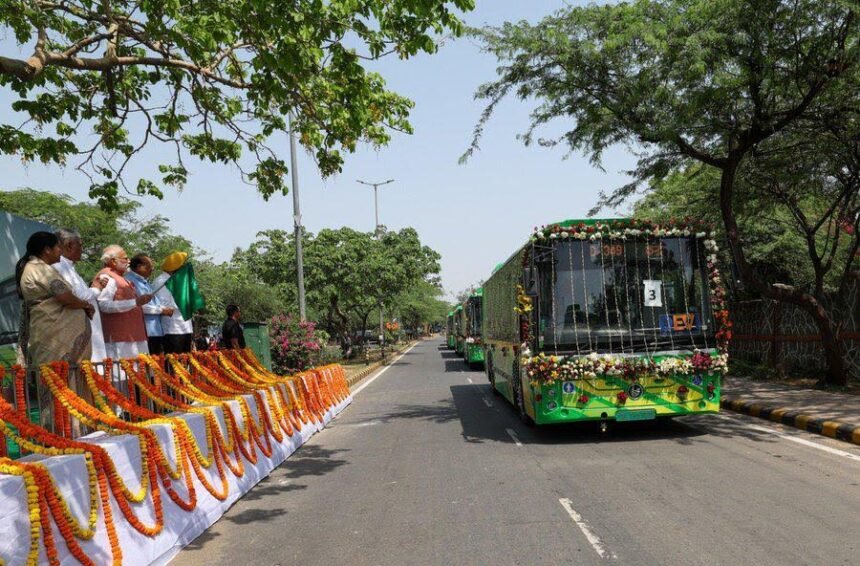Staff Writer
New Dehi: On World Environment Day, New Delhi witnessed a landmark moment in India’s journey towards sustainable urban development and environmental stewardship. Prime Minister Narendra Modi flagged off 200 electric buses manufactured by PMI Electro Mobility, marking a significant stride in the country’s efforts to promote green, zero-emission public transportation. The event, held in the capital, was more than a ceremonial gesture—it reflected a profound commitment to reimagining urban mobility and ensuring a cleaner, healthier future for generations to come.
The new electric buses, part of PMI’s DEVi series, are set to ply on 30 green routes across Delhi. Their introduction is a pivotal component of a broader strategy to curb vehicular pollution, improve air quality, and reduce the city’s carbon footprint. Supported by the Delhi Government, this initiative exemplifies how national and regional leadership can align to drive meaningful change. It also resonates strongly with the ethos of “Ease of Living” that Prime Minister Modi has championed—prioritizing solutions that not only serve environmental goals but also elevate the everyday experience of citizens.
Addressing the gathering, the Prime Minister emphasized the transformative impact of clean mobility solutions. He underscored how initiatives like these not only foster a healthier environment but also serve as critical enablers of inclusive growth and urban resilience. Later, taking to social media, he shared his vision with a post on X (formerly Twitter), reinforcing the government’s dedication to a “clean and green Delhi” and acknowledging the role of sustainable infrastructure in improving the quality of life in urban centers.
But the day’s events did not end with the launch of electric buses. In a deeply symbolic act, the Prime Minister participated in the “Ek Ped Maa Ke Naam” campaign by planting a Banyan sapling at Bhagwan Mahavir Vanasthali Park. The campaign calls on every citizen to plant a tree in their mother’s name—an act that not only nurtures nature but also reinforces the emotional bond between people and the planet. By rooting environmental action in personal and familial values, the initiative seeks to cultivate a more intimate sense of responsibility toward ecological preservation.
Complementing this message of grassroots engagement, PMI Electro Mobility initiated a unique outreach effort of its own. The company distributed 10,000 biodegradable seed cards embedded with Basil and Wildflower seeds to residents in Delhi. These eco-friendly cards, when planted, are designed to germinate within two weeks, encouraging citizens to take part in enhancing the city’s green cover. People were invited to share their planting efforts on social media, further amplifying the campaign’s impact and creating a ripple effect of ecological awareness and civic pride.
For PMI Electro Mobility, the moment was one of both celebration and reflection. Speaking at the event, CEO Dr. Aanchal Jain expressed immense pride in contributing to the Prime Minister’s vision of a “Green Viksit Bharat.” She acknowledged the role of progressive policies and visionary leadership in shaping PMI’s journey, calling the occasion not just a corporate milestone but a reaffirmation of the company’s mission to serve as a catalyst for sustainable innovation.
With more than 2,500 electric buses now operating in 31 cities across India, PMI’s fleet is helping the country avoid an estimated 250,000 metric tons of carbon dioxide emissions every year. Over the operational life of these vehicles, the total reduction in emissions is projected to surpass 3 million metric tons—a powerful testament to the tangible impact of clean transport technologies.
The convergence of clean energy transportation and citizen-led environmental efforts on a day dedicated to the planet was more than symbolic. It highlighted a holistic model of development, where innovation, policy, and public participation come together to build a more resilient and inclusive future. As the electric buses begin their journeys across Delhi’s roads and saplings take root in parks and homes, the message is clear: sustainable transformation is not only possible—it is already underway.








